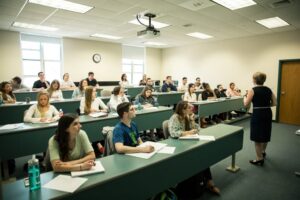by The Cowl Editor on October 4, 2018
Campus

by Kelly Wheeler ’21
Opinion Staff
Technology dominates today’s modern era. Whether you are a student or a member of the working world, chances are you predominantly rely on technology to access information and communicate with others. However, despite our lives becoming increasingly digitized, many professors prohibit the use of laptops in their classrooms.
The main objection that professors have against computer use in the classroom is that laptops can be a source of distraction for students. Professors cannot see what their students are doing behind their screens, and they could be online shopping or scrolling through their Facebook pages instead of taking notes.
Although this concern is valid, professors should not be able to dictate how students can and cannot take notes. Students are paying for their college educations. Yes, students may use their computers during a class for non-educational purposes, but that is their choice. It is up to the student, not the professor, how they choose to spend their time in the class. Students will face the repercussions of their irresponsible actions when exam day comes around. Professors should not treat their students like kindergarteners, for college students are adults with the ability to make their own decisions and understand potential consequences.
Additionally, everyone learns differently. Many students find typing to be a more effective approach for note-taking, especially given the fast-paced nature of college lectures. When students take notes by hand they often find themselves frantically jotting down every word that they see or hear without processing what they are writing. As a result, they frequently leave their classes with pages full of notes that they do not even understand. However, when students can take notes on their laptops, they have the time to think about the information presented to them. Typing enables them to get their notes down quickly, allowing them to look over their notes and ask questions before their professor moves on to a new topic.
Taking notes on a laptop also eliminates the possibility of messy note-taking. If a student is rushing while writing in class, or if they simply have poor handwriting, their notes may be illegible. The uniform fonts and spell check tools used in word processing software on computers prevent these problems that may hinder a student’s learning.
Using computers for note-taking also has an environmental benefit, as it eliminates the need for paper. Students ordinarily buy notebooks for each of their classes, and most of the time, a large portion of paper is leftover only to be thrown out at the end of the semester. Using an electronic device instead of paper for note-taking purposes can lessen students’ ecological footprints.
Like all technology, computers come with various pros and cons. However, a professor’s wariness about laptop usage in the classroom should not restrict students from experiencing the benefits that computers can provide.